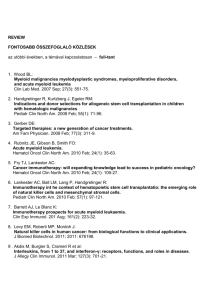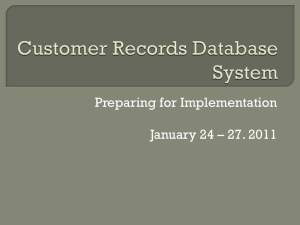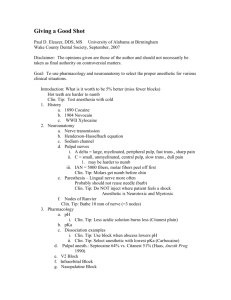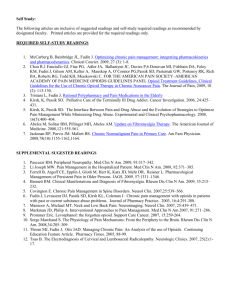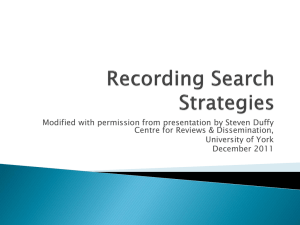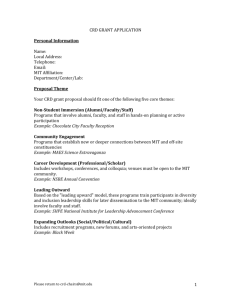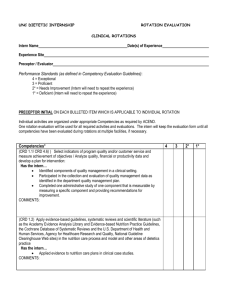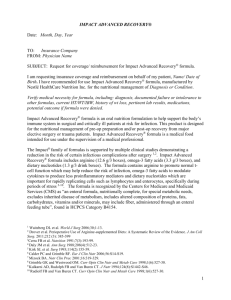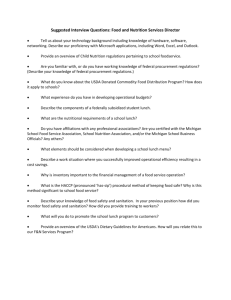requirements to be completed by all interns
advertisement
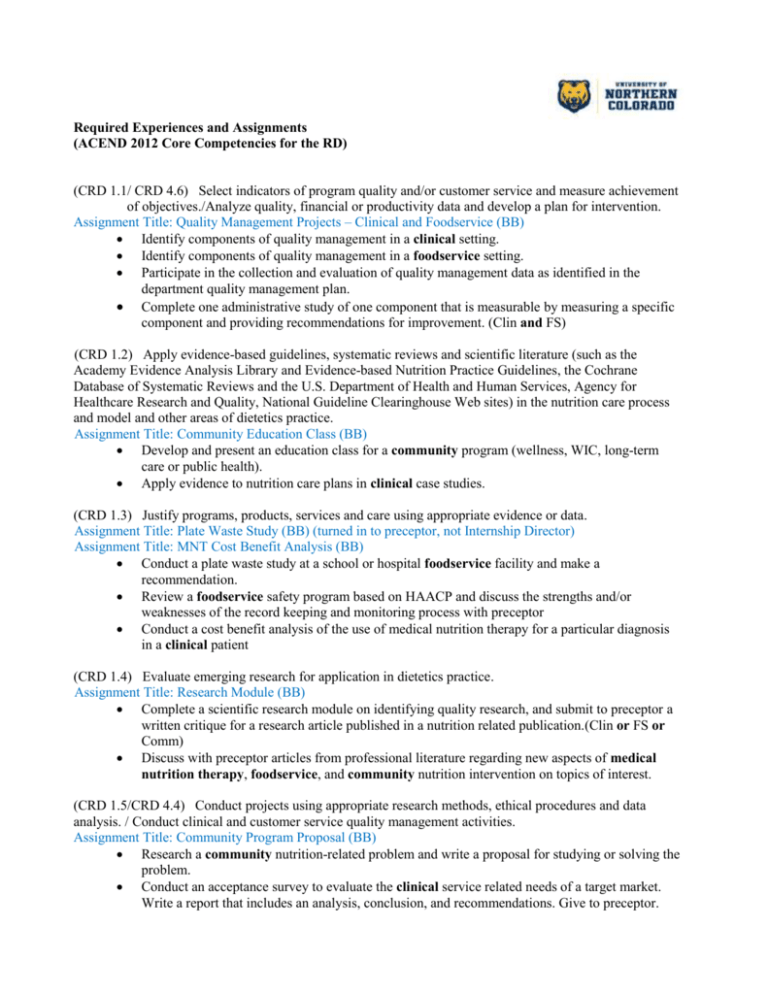
Required Experiences and Assignments (ACEND 2012 Core Competencies for the RD) (CRD 1.1/ CRD 4.6) Select indicators of program quality and/or customer service and measure achievement of objectives./Analyze quality, financial or productivity data and develop a plan for intervention. Assignment Title: Quality Management Projects – Clinical and Foodservice (BB) Identify components of quality management in a clinical setting. Identify components of quality management in a foodservice setting. Participate in the collection and evaluation of quality management data as identified in the department quality management plan. Complete one administrative study of one component that is measurable by measuring a specific component and providing recommendations for improvement. (Clin and FS) (CRD 1.2) Apply evidence-based guidelines, systematic reviews and scientific literature (such as the Academy Evidence Analysis Library and Evidence-based Nutrition Practice Guidelines, the Cochrane Database of Systematic Reviews and the U.S. Department of Health and Human Services, Agency for Healthcare Research and Quality, National Guideline Clearinghouse Web sites) in the nutrition care process and model and other areas of dietetics practice. Assignment Title: Community Education Class (BB) Develop and present an education class for a community program (wellness, WIC, long-term care or public health). Apply evidence to nutrition care plans in clinical case studies. (CRD 1.3) Justify programs, products, services and care using appropriate evidence or data. Assignment Title: Plate Waste Study (BB) (turned in to preceptor, not Internship Director) Assignment Title: MNT Cost Benefit Analysis (BB) Conduct a plate waste study at a school or hospital foodservice facility and make a recommendation. Review a foodservice safety program based on HAACP and discuss the strengths and/or weaknesses of the record keeping and monitoring process with preceptor Conduct a cost benefit analysis of the use of medical nutrition therapy for a particular diagnosis in a clinical patient (CRD 1.4) Evaluate emerging research for application in dietetics practice. Assignment Title: Research Module (BB) Complete a scientific research module on identifying quality research, and submit to preceptor a written critique for a research article published in a nutrition related publication.(Clin or FS or Comm) Discuss with preceptor articles from professional literature regarding new aspects of medical nutrition therapy, foodservice, and community nutrition intervention on topics of interest. (CRD 1.5/CRD 4.4) Conduct projects using appropriate research methods, ethical procedures and data analysis. / Conduct clinical and customer service quality management activities. Assignment Title: Community Program Proposal (BB) Research a community nutrition-related problem and write a proposal for studying or solving the problem. Conduct an acceptance survey to evaluate the clinical service related needs of a target market. Write a report that includes an analysis, conclusion, and recommendations. Give to preceptor. (CRD 2.1) Practice in compliance with current federal regulations and state statutes and rules, as applicable and in accordance with accreditation standards and the Scope of Dietetics Practice and Code of Ethics for the Profession of Dietetics. Assignment Title: SOP/SOPP, Code of Ethics (BB) *due end of July Demonstrate understanding of the Code of Ethics and Standards of Practice, HIPAA and Joint Commission in reference to patient care. (Orientation) Identify and discuss with preceptor local, state and federal regulations that influence and affect food procurement, production, distribution and service. (FS) Identify and discuss with preceptor local, state and federal regulations that influence and affect care in long term care facilities. (Clin or FS) (CRD 2.2) Demonstrate professional writing skills in preparing professional communications (e.g. research manuscripts, project proposals, education materials, policies and procedures). Demonstrate ability to use computer hardware, software technology, web-based resources and the Internet to complete assignments and experiences and communicate effectively (Clin, FS, and Comm) Follow facility format and guidelines when developing documents (Clin, FS, and Comm) (CRD 2.3/CRD 2.4) Design, implement and evaluate presentations to a target audience. / Use effective education and counseling skills to facilitate behavior change. ( considering life experiences, cultural diversity and educational background of the target audience) Assignment Title: Nutrition Education Material – Clinical or Community (BB) Create appropriate education materials, conduct and evaluate an in-service training for employees. (Clin or FS or Comm) Use the Academy Evidence-Based Library and develop a written patient / client material in a clinical or community setting. Participate in counseling for acute and non-acute conditions with patients/clients in a variety of age groups and cultures. (Clin) (CRD 2.5/CRD 2.10) Demonstrate active participation, teamwork and contributions in group settings./ Establish collaborative relationships with other health professionals(physicians, nurses, pharmacists, etc.), and support personnel to deliver effective nutrition services. Interact with other healthcare professionals. (Clin or Comm) Participate in information sessions with care givers. (Clin or Comm) Attend patient care conferences as available (Clin) Discuss diet instructions as needed with team members. (Clin) Attend and / or participate in foodservice meetings / conferences with a member of the management team. (CRD 2.6/CRD 2.8) Assign patient care activities to DTRs and/or support personnel as appropriate. (considering the needs of the patient/client or situation, the ability of support personnel, jurisdictional law, practice guidelines and policies within the facility)/Apply leadership skills to achieve desired outcomes: Provide RD/management staff relief (80 hours minimum, 40 in Clinical, 40 in Foodservice). (Clin and FS, Comm - optional) Review methods of prioritizing patients for nutritional care in clinical setting. (CRD 2.7) Refer clients and patients to other professionals and services when needs are beyond individual scope of practice: Use appropriate judgment and refer clients and patients to other professionals and services when needs are beyond individual scope of practice.(Clin or Comm) Investigate and develop material detailing available resources in the community. (Clin or Comm) (CRD 2.9) Participate in professional and community organizations: Attend meeting(s) of professional organizations as available. (Clin, FS, or Comm) Participate in a community organization’s outreach activity (Food Bank, Salvation Army, etc.)(Comm) (CRD 2.11) Demonstrate professional attributes within various organizational cultures (showing initiative and proactively developing solutions, advocacy, customer focus, risk taking, critical thinking, flexibility, time management, work prioritization and work ethic). Use appropriate judgment when initiating change and improving quality in the organization. (Clin, FS, and Comm) Use critical thinking, flexibility, and time management skills when completing projects within the organization. (Clin, FS, and Comm) Participate in activities to promote the dietetic profession and advocate for clients and/or consumers. (Clin or FS or Comm) (CRD 2.12) Perform self assessment, develop goals and objectives and prepare a draft portfolio for professional development as defined by the Commission on Dietetic Registration. Assignment Title: Professional Development Portfolio Project (BB) Complete Steps One-Four for the Commission on Dietetic Registration’s Professional Development Portfolio Process. (Clin, FS, and Comm) (CRD 2.13) Demonstrate negotiation skills (while respecting life experiences, cultural diversity and educational background of other parties). Participate in and complete a group project with peer interns. (Orientation) Participate in supervisory decision making while completing staff relief (Clin and FS) (CRD 3.1.a.) Assess the nutritional status of individuals, groups and populations in a variety of settings where nutrition care is or can be delivered. Assignment Title: Clinical Case Study Outline (BB) Interview patients/clients and gather information appropriately to complete an assessment and subsequent direction of nutritional needs. (Clin, Comm-optional) Conduct general screening and assessment using lab values, other measures, and facility checksheets as needed. (Clin, Comm – optional) Demonstrate understanding of Global Nutrition Assessment for interpreting degree of risk. (Clin) Conduct nutrition assessment of individual patients/clients with uncomplicated instances of common medical conditions, e.g., hypertension, obesity, diabetes, diverticular disease. (Clin) Complete case studies relevant to common medical conditions. (Clin) (CRD 3.1.b.) Diagnose nutrition problems and create problem, etiology, signs and symptoms (PES) statements. Assignment Title: Clinical Case Study Outline (BB) Apply and interpret lab values for appropriate patient / client evaluation. (Clin, Comm – optional) Assess nutritional status of individual patients/clients with complex medical conditions, e.g., renal disease, multi-system disease, organ failure, and trauma.(Clin) Complete case studies relevant to complex medical conditions. (Clin) (CRD 3.1.c.) Plan and implement nutrition interventions to include prioritizing the nutrition diagnosis, formulating a nutrition prescription, establishing goals and selecting and managing intervention. Assignment Title: Clinical Case Study Outline (BB) Develop nutrition intervention plans for a variety of acute and non-acute experiences and give an inservice presentation to clinical staff on a selected plan. Conduct nutrition care component of interdisciplinary team conferences to discuss patient/client treatment and discharge planning. (Clin) Coordinate and modify nutrition care activities among caregivers (Clin, Comm – optional) Chart as is appropriate in the clinical or community setting. (CRD 3.1.d.) Monitor and evaluate problems, etiologies, signs, symptoms and the impact of interventions on the nutrition diagnosis. Manage monitoring of patients’ / clients’ food and / or nutrient intake. (Clin) Achieve an entry level of competency in this area through the activities of case studies, diet instructions, menu modification, calorie counts and other monitoring practices during the course of the internship. (Clin) Select, implement and evaluate standard enteral and parenteral nutrition regimens. (Clin) Achieve an entry level of competency in this area through the activities of case studies and client monitoring. (Clin) Follow at least one client / patient as the individual moves from one nutrition support to another, e.g., total parenteral nutrition to tube feeding to oral diet. (Clin) (CRD 3.1.e) Complete documentation that follows professional guidelines, guidelines required by health care systems and guidelines required by the practice setting. Write notes for medical records and review with preceptor.(Clin) Use appropriate abbreviations for documenting patient/client medical records.(Clin) (CRD 3.2) Demonstrate effective communications skills for clinical and customer services in a variety of formats (using oral, print, visual, electronic and mass media methods for maximizing client education, employee training and marketing). Assignment Title: Nutrition Article for the Public (BB) Assignment Title: Cafeteria/Dining Room Promotional Activity (BB) Assignment Title: Nutrition Education Material – Clinical or Community (BB) Use the SMOG or similar readability formula effectively for developing written materials for patient, client and general populations. (Clin or Comm)(can be completed in nutrition education concentration) Plan, coordinate and participate in a cafeteria / dining room promotional activity. (FS) Participate in a community awareness activity (i.e., health fair, publish an article) (Clin or Comm) (CRD 3.3/CRD 4.9/ CRD 4.10) Develop and deliver products, programs or services that promote consumer health, wellness and lifestyle management (consider health messages and interventions that integrate consumer desire for taste, convenience and economy with nutrition, food safety)./ Analyze financial data to assess utilization of resources./ Develop a plan to provide or develop a product, program or service that includes a budget, staffing needs, equipment and supplies. Write an employee schedule for one cycle. (Clin or FS) Work with the foodservice manager to review planning and goal setting for the department. (FS) Participate in a community based health promotion/ disease prevention program. (Clin or Comm) Revise and distribute a modified recipe for consumers or clients. (Clin or Comm) Review weekly, monthly and yearly foodservice budget and other tools of financial management that are utilized. (FS) Discuss with preceptor menu costs in terms of food, labor and operating / overhead costs. (FS) Review organizational chart of hospital to see how nutrition services relates to other departments. (Clin and FS) Review budget for clinical nutrition services Review budget for community agency services. (CRD 3.4) Deliver respectful, science-based answers to consumer questions concerning emerging trends. Identify an emerging trend of concern for consumers and develop a client/patient fact sheet to answer commonly asked questions. (Clin or Comm) (CRD 3.5) Coordinate procurement, production, distribution and service of goods and services. Observe the flow of foods through the procurement, preparation, distribution, service and disposal systems of the facility. (FS) Review department policies and procedures with respect to food procurement, production, distribution and service. (FS) Participate in and evaluate the distribution and service of meals. (FS) Conduct a food inventory and place a food order. (FS) Participate in as many of the following community programs as is feasible, identifying program mission and objectives: • Food Stamp Program • Summer Foodservice Program for Children • Child and Adult Care Food Program • Food Distribution Program (Food Bank) • Commodity Supplemental Food Program • Congregate and Home-Delivered Meal Programs (CRD 3.6) Develop and evaluate recipes, formulas and menus for acceptability and affordability that accommodate the cultural diversity and health needs of various populations, groups and individuals. Assignment Title: Sensory Evaluation (BB) (turned in to preceptor, not Internship Director) Demonstrate competency in this area by revising individual patient menus. (Clin or FS) Write a cycle menu for a target population. (Clin or FS or Comm) Develop and implement a standardized recipe for a regular or modified food item. (FS) Conduct a sensory evaluation of a new commercially prepared food product or new recipe. (FS) (CRD 4.1) Participate in management of human resources. Review departmental policy / procedure manual, employee manual, job description and personnel policies regarding recruiting, interviewing, hiring, orienting, training, appraising and terminating employees. (Clin and FS) Participate in human resources activities, as the experience becomes available. (Clin, FS, and Comm) Review the organizational chart of facility to see how foodservice relates to other departments.(FS) Discuss employee turnover, employee productivity and job satisfaction in the foodservice with a preceptor. (CRD 4.2) Perform management functions related to safety, security and sanitation that affect employees, customers, patients, facilities and food. Assignment Title: Equipment Selection Project (BB) Assignment Title: HACCP Project (BB) Complete a sanitation / safety check of the foodservice facility. Develop a HACCP flow chart for one recipe. (FS) Conduct temperature checks of prepared foods at the point of service. (FS) Review current equipment usage and facility layout and design.(FS) Write specifications and justification for a new piece of foodservice equipment. (CRD 4.3) Participate in public policy activities, including both legislative and regulatory initiatives. Assignment Title: Community Legislation Project (BB) Complete a legislative project. Identify regulatory agencies that would oversee signed legislation. (Comm) Identify grassroots efforts being made by a professional organization such as the Academy or SNE. (Comm) (CRD 4.5) Use current informatics technology to develop, store, retrieve and disseminate information and data. Review and discuss with preceptor computer resources and applications specific to foodservice, i.e., forecasting, menu planning, inventory, productivity assessment, employee scheduling, production scheduling, nutrient analysis, financial management. Review and discuss with preceptor computer resources and applications specific to clinical dietetics, i.e., patient medical charts, laboratory data, financial management (CRD 4.7) Propose and use procedures as appropriate to the practice setting to reduce waste and protect the environment. Evaluate a facility’s waste management/recycle policy and recommend improvements if needed. (FS) Review food procurement procedures to determine what foods are purchased from local or sustainable sources (FS) (CRD 4.8) Conduct feasibility studies for products, programs or services with consideration of costs and benefits: Assignment Title: Make or Buy (Value) Analysis (BB) Conduct a “make or buy” decision analysis.(FS) (CRD 4.11) Code and bill for dietetic/nutrition services to obtain reimbursement for services from public or private insurers. Participate in billing functions for nutrition services with clinical nutrition manager or other responsible individual. (Clin)
